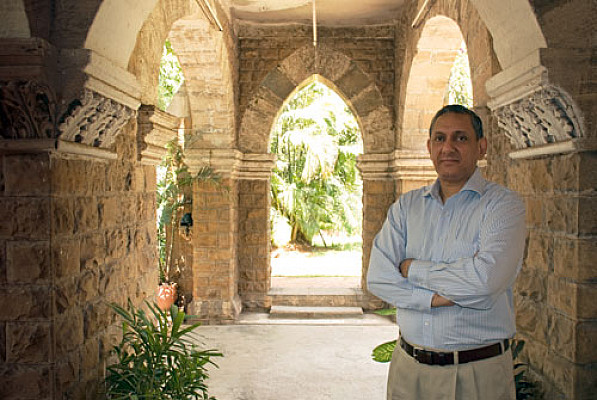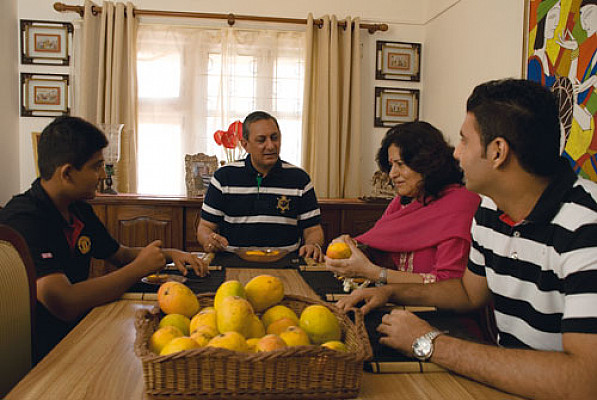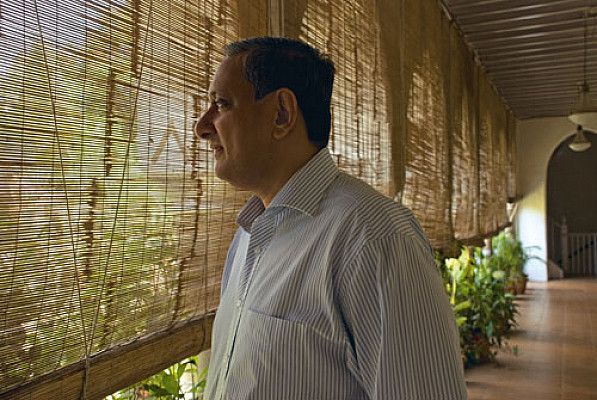The Passion of Rakesh Maria
Terror attacks and bomb blasts. Undercover agents and secret informants. Bulletproof jackets and AK-47s. 9/11 and 26/11. Nabbed suspects and solved cases. Fact or fiction? Real or reel? All these and more are the stuff that Bond movies, detective novels and Hindi films are often made of. Yet, with nail-biting action and bullet-riddled encounters, they are willy-nilly also the elements that make up the life of the many who work 24/7 so that we can live and sleep safely. Closer home, in Mumbai, the task of assuring immunity from terror attacks is in the hands of the Anti-Terrorism Squad. In April this year, this squad was entrusted into the able hands of 52-year-old Rakesh Maria who was promoted to the rank of Additional Director General of police and made the Chief of the Anti Terrorism Squad (ATS).
To try and pin him down for an exclusive session for Verve, I make my first trek to his eminently-missable Byculla office and go through the routine checks with equanimity. A flight of wooden steps up and I am on a verandah where an armed cop keeps vigil amidst a few potted plants. A plainclothes officer peers out through a room, in between monitoring his console. A very short wait outside Maria’s cabin, and then I am ushered in by his assistant. About a dozen chairs are lined like sentinels opposite his huge desk. The niceties over, after some initial reluctance, he agrees to speak and shoot on another day. Two appointments are fixed – both cancelled as some last-minute urgent assignment that crops up in his schedule eats into my allotted time. Finally, on a Saturday, I am headed first to his home on an off-shoot of Napean Sea Road and then to his office, where the top cop will later delve into the memories that make up his life.
As we walk into his apartment, it is a few minutes before Maria appears. His wife, Preeti and sons, Kunal and Krish, express immediate surprise that the officer has agreed to do this! Talking about life with their father, they comment that they have got used to living with a top cop and Preeti says, “He tries to switch off before walking in through our door. But from his face I can read how the day has gone. Luckily he is one person at work, another at home.” Yet life with a cop has touched them, as Kunal, who is studying law at Government Law College, admits, “The psyche of terrorists fascinated me. For a while I thought of following Dad into the profession but then the idea fizzled out.”
As I wonder aloud if it was seeing the pressure of their father’s life that turned him off, Maria interrupts with a smile, “Don’t start them on that trip.” I turn around to find that he has entered the room, clad casually in a Tee and trousers – he walks softly for his six-foot-plus build. Game for the shoot first, Preeti dishes up slices of mangoes with cups of chai as the Maria boys settle down comfortably around the table. The shots over, with a quiet swiftness, Maria leaves for office, having changed into a more formal garb – “He will never be seen at work in a Tee,” interjects his wife. We quickly follow suit…and soon I find myself back in a familiar zone.
Walking up the steps to his first-floor office, I see a board on which his name is painted – just a little above is one more familiar name, that of Hemant Karkare, the ATS chief who died on 26/11. Naturally, as I sit on the middle chair in the first row, the conversation kick-starts from that crucial night, for even though Maria has been instrumental in cracking other crucial cases – the Gateway of India and Zaveri Bazaar blasts case, the 1993 serial blasts – 26/11 was a watershed day.
Rewinding to those traumatic nights, Maria says softly, “The training and outlook of the police changed after 26/11. One was used to bomb blasts, in a taxi or a cab at iconic locations, transport systems, but an incident like that, not at all. The conspiracy was hatched abroad, the terrorists were trained, equipped and launched abroad and the plan was only executed here. The sheer ingenuity of the operation left everyone stunned. I remember how after 9/11 in America, the commission set up asked if it was an intelligence failure. They said it was a failure of imagination. Here for us also it was the same. I don’t think even films had ever depicted something like that.”
As cops and citizens perished on the roads of Mumbai on a night that no one will ever forget, many questions were raised. One that referred directly to the present ATS chief was ‘Where was he that night?’ Unhesitatingly, Maria replies, “I had come to the crime branch to rush with my boys to the Taj. But the Commissioner of Police asked me to go to the control room and take charge there. I was there right through the period. My son was taking a bus from Sion to go to Ahmednagar. When my wife spoke to me soon after the trauma started – it was the last conversation I had with her for 24 hours – she asked me if Kunal should travel or return home. At the back of my mind, like any father, I thought God forbid if this whole city is finished, we are all finished then there is someone in the family who will be safe. After that I did not speak to my wife at all.”
The scars of that night have remained – as they have on all of us – on his sons and wife. As his attendant brings in a tray with tea on it, Maria continues, “Krish often phones me up in the office just like that. I know, even though he will not tell me, that he wants to assure himself that his dad is safe. Even my wife, after I have left home, around the time that she expects me to have reached office, calls me up. It is to find out if I have reached safely. The safety factor does bother them. Repeatedly information comes in that you are on the hit list of so-and-so gang or terror group but as I told I am not afraid of being on the hit list. The only thing that frightens me is the failure of not performing.”
Maria himself brushes the fear fixation aside; it’s something that does not bother him. “In the late ’70s and early ’80s, the police had an aura about them,” he remembers. “It was only later on when terrorism increased and organised crime raised its head and became powerful, the police force began to experience greater levels of danger. The serial blasts saw the fear factor emerge. But, our training helps, the force is there. And I am sure that this also will pass.”
The tray of tea has been completely forgotten as our conversation delves into the mind of an officer who is the man who has to ensure that Mumbai remains safe and terror-free. He is aware of the huge burden that he shoulders, for he says, “It is the responsibility that is frightening. People expect a lot from us and that is evident from the messages one gets, the letters that are sent to us and the people who meet us every day. Everyone feels we must deliver and deliver fast. I am not afraid of the terrorists. I am not afraid of the underworld. But my biggest fear is the fear of not delivering.”
It’s not an easy job especially in these tough times. The man in the hot seat states, “The force looks up to you. You have to constantly motivate your men, inspire them to action and finally have to lead by example. That itself is a challenge. Performing all the time, not letting the people down, not letting the department down, not letting your bosses down; that I feel is the biggest stress of all. And given the nature of the department, at the ATS we have to collect intelligence to prevent an attack not just cope with one. In short, we are constantly trying to remain one step ahead of the terrorist. For this we need a very elaborate and good informant network system. And in the eventuality of an attack taking place, one is required to nab the terrorists as soon as possible. No time can be lost.”
It is said that the character of Ajay Lal in Suketu Mehta’s novel Maximum City was inspired by Maria and in the movie Black Friday, actor Kay Kay Menon plays a role based on him. An IPS graduate from the batch of 1981, Maria interestingly hails from a film family that has their own production house Kala Niketan and has grown up on a diet of films. “Thanks largely to what the film industry portrays, everyone thinks that third degree is the only way interrogations take place. This is absolutely off the mark. Just beating and torture does not get you answers or answers that will stand up. The terrorist today is completely indoctrinated. One needs to understand his or her psychology, break his or her mind to get information from him or her. Apart from this there are lawyers, courts, NGOs and strict laws in place. So, the general perception that a criminal breaks down after a beating, is not true. We use a lot of mental games when we interrogate the accused. I often step in and do it myself. Kasab was interrogated by me for the first time on the 27th at around four or five a.m.”
That night is just one example of the round-the-clock commitment that his work entails. And it is the sign of the changing times that “you cannot afford to relax for a bit with all that is happening, not just in the city but in the whole world. There is simply no time. Maybe God has willed that this lifetime of mine is not to be spent with family but focussing on my career and job. Every night I leave office at 11.00 or 11. 30 p.m. Till two or three in the morning, the telephone calls continue – informants phone in, operations are on. And the first call comes from the control room at 7.30 a.m. My wife Preeti has stoically accepted it. She takes all the decisions and informs me at night. Luckily, when there are holidays and the kids can afford to stay up, I call them into the room when I return and we sit up and chat.”
While we were at their home, I heard Maria telling his wife that he cannot make it for a wedding at night, just one of the many family occasions that he has missed out on. Maria says, “Kunal was four when the serial blasts took place. From that time, life changed. And all of a sudden, he passed out from school and I didn’t even realise where time had gone. I should have gone to his football or basketball games but could not. These are things which don’t come back and even if you have photographs, it is not the same thing. Now being Joint Commissioner of Police Crime and Additional Director-General, ATS, with my younger son, I think life is going back to ’93. I am missing out on the same things again. Kunal understands, but Krish still throws tantrums. I had promised to attend his finals of an under-14 cricket tourney, but on that day we received an important intelligence input that needed to be worked on. At night, when I returned home, he refused to speak to me till Kunal reasoned with him. And, I had to apologise. I have also told the family not to expect me to take any holidays or spend time with them throughout the year. But at the end of the year in December I take ten days leave and am at their beck and call. I still feel that it is not enough. There are so many things I would love to do with the family. Just playing basketball, cricket or football outdoors with the boys is so relaxing but they are growing. Soon they will be leaving home, getting married and that is the time that it is going to hit me the most. That I did not enjoy their company when they were at home.”
This is the life that Maria has chosen for himself, having dreamt of joining the force right from the time he was a kid. He smilingly admits, “I always wanted to join the uniformed service. I was infatuated by the uniform, its dignity and the discipline. When I look back I remember that I was class monitor right from the second or third standard, ultimately becoming head boy of my school. Even the teachers and principal knew that if the class had to be controlled I was the one who could do it and I would be be invariably picked up. Maybe from childhood policing was there in my nature. Later, I knew that for me it was very specific. It was either IPS or nothing else.”
All things taken into account, the journey so far has been satisfying. Cases have dotted his career and given him the satisfaction he seeks. “I find it all very thrilling. You get a case; you get a lead and work on it. Often the chase is there and the thing develops. You plan out operations, arrest someone and a big group is neutralised. That gives me a high. It is also extremely satisfying that one can help so many people. In the Neeraj Grover case, the parents came and cried; their son was missing. Unfortunately we could not save the boy, but they later came and thanked us. The look on their face when they do that is more than enough compensation.”
The job satisfaction apart, there have been plenty of moments that have given him heartburn. With great power come great responsibility and a fair degree of isolation. Often in the news when things go wrong, more than when they have gone right, for as Maria says, “Success is shared by everyone but when failure comes to your doorstep, you fail alone. In this time, executive decisions are solely yours. If you fail the blame is yours, accountability is there. You cannot share it. The force looks up to you for prompt, clear and correct decisions.”
Uneasy lies Maria’s head for he wears the ‘crown’ – and, like Atlas, he cannot shrug off the load at will. No wonder then that he admits, “I don’t think I have slept for more than three to four hours at a stretch for the last three or four years. Today, something happening in New York or London or Pakistan directly affects some other part of the world. After 26/11 the police force all over the world learnt lessons but unfortunately it was at our expense. Every decision has two sides. And the scrutiny is terrible.”
It is the scrutiny and glare of public attention that has messed up another pitch that Maria ‘plays’ on. While cases are being solved or events are in progress and action is being taken, he feels, “Breaking news reveals plans. In investigations, the element of surprise is essential to nab the accused. So, the handlers and bosses know what is happening. We have to keep that in mind while investigating. Policing has become more difficult today than what it was in the early ’80s or ’90s. I would prefer the ’93 era any day.”
In the course of the conversation and his swift forays to the covered verandahs for the photo-shoot, I have noticed a couple of rings on his fingers and I also recall seeing beautiful statuettes of Lord Ganesha in his home. Given the level of danger and risk that he lives with, it would be natural to turn to some sort of religious solace or talisman. But, no that is not for Maria, for he says, “I am not superstitious. My mother gave me these rings. I am a private person when it comes to religion and very rarely go to religious places. My wife comes from a family of Arya Samajis so at home expression of religions is not formal. And believe me, in the police department you cannot afford to be superstitious. You take each day and situation as it comes.”
One of the many phones that are on the table on his left, rings; he picks it up and is for a moment distracted. Just realising how swiftly time has flown in this gripping interaction, I fire my last salvo at the man who is focussed on keeping Mumbai safe: ‘Any regrets about joining the profession?’ Maria thinks for a moment and confesses, “I do not regret joining the force. If I could rewind my life, I would do the same thing again. But in all the years, I have only one regret – the loss of the three officers on 26/11. I wish I could have told them not to go there; it was not a feasible act. But that was not possible given that we were entirely dependent on wireless messages to know what was happening. Post 26/11, we have got fantastic equipment; the government has given us everything – speedboats, jackets, bullet-proof vehicles, sophisticated communication technology. It required a crisis to get us that. If only I could go back….”
Related posts from Verve:
Verve Trending
Sorry. No data so far.
us on Facebook to stay updated with the latest trends









